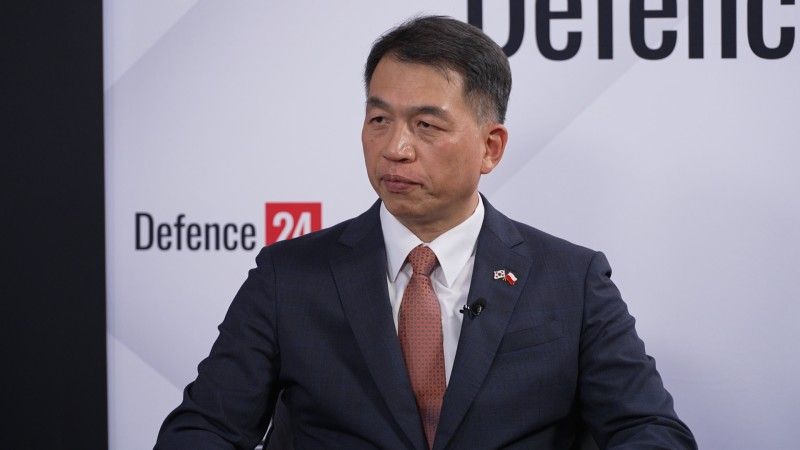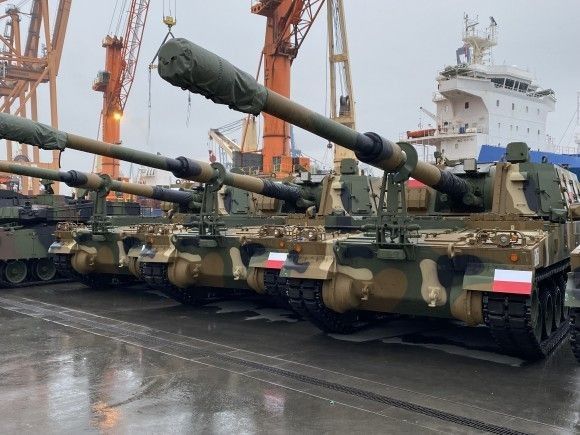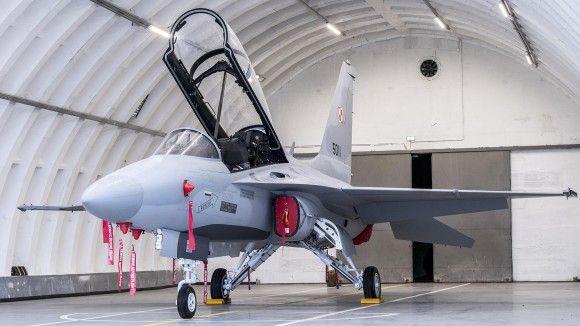Defence Policy
Korean Minister: Additional Funding for the Modernization of Polish Armed Forces

Photo. Defence24.pl
Also, the Korean commercial banks, the private banks, they agreed to consolidate some form of funds, which will provide additional USD 7.5 billion. So this is a very substantial funding for developing the defence industrial cooperation between our two countries as Mr. SUNG IL, Deputy Minister of the Ministry of National Defense, Republic of Korea, told Defence24.pl in an interview.
Jędrzej Graf: The Korean National Assembly has just agreed to increase the capital of Eximbank, a state-owned Korean investment bank. Deputy Minister, how can this decision support the second phase of procurement of Korean equipment by Poland, including the co-production of K2 tanks, K9 howitzers and K239 Chunmoo systems?
Mr. SUNG IL, Deputy Minister of the Ministry of National Defense, Republic of Korea: First of all, this is very good news for both Poland and the Republic of Korea, because we have made a lot of effort to increase the capital of Korean Eximbank. Due to our tremendous efforts, the Korean National Assembly passed the revision bill to raise Eximbank’s capital by 60 percent. This adds capital to loans for foreign countries including Poland.
For Poland we have made a decision to provide a loan for USD 10 billion for Executive Contract 1, and for the Executive Contract 2 and 3 we will have more financial support from the Korean Eximbank thanks to the new law. According to the new law, we can provide a loan to Poland amounting to USD 8.5 billion. That means the size will be almost the same as in Execution Contract 1. I believe that this financial support, its availability can help to conclude the next contract and the following one.
Also, the Korean commercial banks, the private banks, they agreed to consolidate some form of funds, which will provide additional USD 7.5 billion. So this is a very substantial funding for developing the defence industrial cooperation between our two countries. We are able to use this funding for the next programs. So those are very good decisions for the progress of our programs.
Recently a Korean high-level delegation visited Poland to discuss the defence procurement and cooperation with the new leadership of the Polish Ministry of Defence. What are the next steps? How do you assess the chances of signing 2 phase agreements and co-production in Poland, of K2, K9, and Chunmoo in the coming months?
This last meeting took place in February as DAPA Minister visited Poland. This was the first meeting with the new Polish government on the defence industrial cooperation between our contracts. We have a very positive response from the Polish government and we are glad to come to the next steps.
The next step is going to be Executive Contract 2, which contains localization plans. The Korean government has already express a lot of times that we are willing to provide some technologies to build manufacturing capabilities inside Poland. It will help Polish defence industry. And it will support the capacity of defence industry of Korea as well, because we are facing North Korea war threat on a daily basis. We have been in a kind of an emergency situation for seventy years. So if we have a strategic partner in a new area, especially in Europe, this is an opportunity to have strategic reserve stocks.
And this is why we are very willing to provide localization and support, second phase will be a localization phase. I hope that the Execution Contract 2 will be signed very shortly and it is going to be a start point of localization in Poland. It will support the defence industry in Poland, but also the war reserve plan and stocks.

Photo. Jarosław Ciślak/Defence24.pl
One of a key and sensitive fields nowadays is the production of ammunition. Do you see a potential of cooperation between Korea and the Polish government, industry and Armed Forces in this area?
Certainly. Actually, when I visited Poland, I always talked to people responsible for the area of ammunition production. And they were willing to have Korean investment and Korean technologies on the field. And Korean companies, such as Poongsan and Hanwha also have will to cooperate with the Polish munitions manufacturers. And simultaneously we have been requested by other countries to build munitions factories there, so some Korean companies may be comparing proposals now. But I believe if we have to have a munitions plant in Europe, Poland is the best choice, because Poland is the biggest country to use Korean-manufactured weapons systems.
So if you are making munitions for that, this can be a kind of reserve stocks for the Republic of Korea. Poland can also be a center for the manufacturing of weapons and ammunition. Central Europe certainly needs weapons and ammunition. So this would be benefitial not only for our countries, but also for the neighbouring countries.
What could you say about the current state of the ammunition program between Republic of Korea and Poland?
One point I would like to make is that from what I heard, Polish officials and industry are talking to Hanwha and Poongsan in a separate way. While both Hanwha or Poongsan could be interested each in taking most of the Polish orders and making highest profits on it, I would recommend Polish authorities to consider letting the two companies come together, consolidate with a one goal of providing transfer of technology of ammunition.
This is because the offers of two companies are complementary to a good extent. Poongsan is making steel cases of shells and Hanwha is making projectiles and powders, so for a full production they have to consolidate. I think we as a Republic of Korea MOD could support such a solution on a government level.
I think regarding ammunition, not only the type of ammunition is important, but also the scale of production. Nitrocelulosis is one of the most important materials to produce munitions, and currently Poland does not have a capability to produce nitrocelulosis. Do you think such an investment, to produce nitrocelulosis and transfer of an appropriate technology, could be a part of a Polish-Korean cooperation?
In the past, there was some hestitation to provide those kinds of technologies, because those are very sensitive technologies. Some foreign countries asked us about this kind of technology in the past, but as you know, this is a very sensitive material. Nowadays, even though ADD and Hanwha have very advanced technologies to handle it, explosions happen with no reason as an accident. Certain level of know-how is needed to receive it, so perhaps as our cooperation progresses, you will have it in the end.
I specifically say know-how, as they say it is not the technology, but exactly the know-how. The technology are relatively simple, the material is quite simple, but the know-how is the key: what temperature do you need to keep those materials and how to mix them and what size of mixer is needed. That kind of knowledge is not technology, it is a know-how. This is a process of learning, sometimes of trial and error. You do not learn it in one step, you learn it in many steps, but I think eventually I believe a Korean company will deliver this capability to Poland.

Photo. sierż. Aleksander Perz / 18 Dywizja Zmechanizowana
I would like to ask you a question about training of Polish Armed Forces soldiers on Korean-provided systems, but also the feedback that Polish soldiers provided to Korea on those systems, their experience. How can this process be benefitial for both countries?
Since we have made a decision to provide several types of Korean-made equipment in Poland, we have invited many officers, and then many NCOs and soldiers to Korea to look at and also experience how to handle this equipment. What I have learned is that Polish soldiers are very enthusiastic and very well trained. Once Polish Government decide to send soldiers to Korea, probably they are very well trained, capable and very well-prepared soldiers, But I surely say and recognize that they have a strong will to learn from Korean soliders.
Once we have decided to sign the contracts, there was an exchange program implemented, and there was an Autumn Fire exercise, while Polish soldiers learn from Korean soliders experience. During those exchange programs, as Korean soldiers say, Polish soldiers are very well trained and patriotic. Even if they do not have knowledge on a certain type of equipment, they already have experience on how to handle Main Battle Tank or howitzers. So while they are exchanging experience, they are learning from each other.
So this kind of exchange program also supports Korea. This year, I believe, there will be more opportunities for such a training and Polish officers and soliders will have better training to use lessons for Korea. As Korea has started providing its weapons for Poland, Korean Mechanized Infantry School and Artillery School have started programs in English, the school did not have such a program earlier. This is also an enhancement for Korea, allowing further improvement of the training, also for Poland.
How does Korea plan to support the sustainment of K2, K9, Chunmoo and FA-50 by the Polish Armed Forces? And as we see recent events in the Red Sea I would like to ask, what is the Korean vision of supporting Poland in case of supply routes disruptions?
Korea is situated far from Poland and other partners and we know how important it is to deliver the equipment and then supply the parts properly. Sea routes are certainly very important. As you mention Suez canal region and the attacks by Houthis, many shipping companies are switching to the route between Asia and Europe around the Horn of Africa, which is taking 10 to 15 days more. We have rescheduled the delivery times so that there is no delay due to that.
If there is another reason for delay, we may use air transportation, as we did during the FA-50 delivery. Also, we have provided some spare parts and tracks for the Dragon exercise via air transportation. And that is why localization is very essential. If you have localization plant in Poland, you have some reserve stocks in your depot, it will help you and also Korea. That may also be a hub for other countries near by Poland, that are also using the Korean equipment. Finland, Norway, Estonia, are using K9 in Europe and they need some support from Korea.
Once you localize the manufacturing and you have some depots there, you could also support those countries.

Polish defence industry has substantial capability, also to absorb the technology procured from the Republic of Korea. But General, in your opinion, what are the key requirements for a successful technology transfer?
First of all, we need to set appropriate objectives for the technology transfer. It is neither possible nor needed to transfer 100 percent of the technologies. Poland already has advanced technologies. Once you receive the transfer, you can adapt it, revise it and use for your own manufacturing. That is how the Korean defence industry developed its own technologies. We have a lot of international cooperation from US, Germany or France, Korea has received some of the technologies from those countries.
Once we develop the systems, we can produce indigenous systems by our own industry. Our final goal should be a similar kind of transfer of technology: not 100 percent from Republic of Korea, we need some kind of level of transfer of technology, which is going to be fulfilled in phased way, so there will be objective 1, 2, 3 etc.. Perhaps a final phase would be a 100 percent transfer of technology, but I don’t think that’s possible from the first phase. And the long-term purpose should be to develop more advanced technologies in Poland, as Poland has already significant development capabilities.
The security situation around the world is deteriorating, as we see not only in Ukraine but also in the Middle East. How does Korea respond to that, with the threat from North increased by the cooperation between North Korea and Russia?
The Korean government is also concerned about that matter. N.Korea and Russia have been close friends for a long time – Russia actually supported North Korea during the Korean War. Nowadays however, North Korea is providing numerous weapons and ammunition to Russia, and North Korea receiving a lot of materials from Russia. We cannot state with certainty what it is – it could be food for example. However, advanced missile and space technology may also be included.
So while Russia and North Korea are getting closer and closer to each other, the threat from North Korea and also the threat from Russia will rise. Some people say that it is now time for Korea to start provide even lethal weapons to Ukraine, which was off the table until now, but I don’t think that is the appropriate reaction. We are worrying about close cooperation of Russia with North Korea, but we have to focus on the North Korean threat. At the same time, what we are going to do is to support Poland more frequently, more closely and actively, because we know Polish military is the key actor in the NATO now and the key element protecting against Russian aggression. So this is the way Korea can support NATO, and we are focusing on NATO issues more now than in the past. President of Republic of Korea and the Minister of Defence will aim to attend NATO Summits or NATO Ministerial Meetings.
So while I believe we will face North Korea as we have done in the past, we will focus more on the Polish issues to support NATO.
Does Korea want to expand cooperation with Poland to new areas, beyond what already has been delivered, like Land Force systems, tanks, artillery and aircraft for the Air Force, and the munitions program we have discussed?
One thing I would like to bring to your attention is the submarine project, as Korea has proposals for the ORKA project. Korea has two of the most advanced naval shipyards - Hanwha Ocean and Hyundai Heavy Industries - and they both can provide best solutions that would be tailored for Polish requirements.
I know that in the naval programs there may be political considerations, but I would invite Poland to consider partnering with the Republic of Korea in the submarine project. The capabilities of our naval shipyards are particularly advanced and modern. Recently, the US Secretary of the Navy visited the Korean shipyards himself. Nowadays, the US is interested in improving its shipbuilding capabilities. The US Secretary of the Navy was very impressed after his visit to the Korean shipyards. It seems that the US is considering the utilization of Korean shipyards in the future not only for building ships but also for maintenance and repair (MRO). As you can see from the US interest in partnering with the Republic of Korea, Korean shipyards are equipped with verified capabilities of the highest quality.
Thank you for the conversation.
